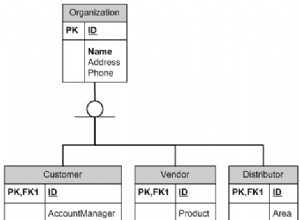Depuis PostgreSQL 9.4, vous pouvez utiliser le ? opérateur :
select info->>'name' from rabbits where (info->'food')::jsonb ? 'carrots';
Vous pouvez même indexer le ? requête sur le "food" key si vous passez au jsonb tapez plutôt :
alter table rabbits alter info type jsonb using info::jsonb;
create index on rabbits using gin ((info->'food'));
select info->>'name' from rabbits where info->'food' ? 'carrots';
Bien sûr, vous n'avez probablement pas le temps pour cela en tant que gardien de lapin à plein temps.
Mise à jour : Voici une démonstration des améliorations de performances sur une table de 1 000 000 de lapins où chaque lapin aime deux aliments et 10 % d'entre eux aiment les carottes :
d=# -- Postgres 9.3 solution
d=# explain analyze select info->>'name' from rabbits where exists (
d(# select 1 from json_array_elements(info->'food') as food
d(# where food::text = '"carrots"'
d(# );
Execution time: 3084.927 ms
d=# -- Postgres 9.4+ solution
d=# explain analyze select info->'name' from rabbits where (info->'food')::jsonb ? 'carrots';
Execution time: 1255.501 ms
d=# alter table rabbits alter info type jsonb using info::jsonb;
d=# explain analyze select info->'name' from rabbits where info->'food' ? 'carrots';
Execution time: 465.919 ms
d=# create index on rabbits using gin ((info->'food'));
d=# explain analyze select info->'name' from rabbits where info->'food' ? 'carrots';
Execution time: 256.478 ms




